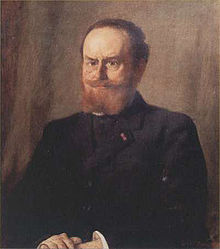Jean-Baptiste de Pauw
Jean-Baptiste de Pauw (born March 30, 1852 in Brussels , † June 10, 1924 in Bussum ) was a Belgian organist , composer and music teacher.
Life
De Pauw received his first music lessons from his father and was admitted to the Royal Conservatory in Brussels in 1864, where he studied with Alphonse Mailly , among others . In 1873 he became organist at the St. Boniface Church in Brussels. He later became organist on the Cavaillé-Coll organ in the Paleis voor Volksvlijt in Amsterdam , where he gave weekly concerts with the palace orchestra and soloists. He turned down the appointment to Haarlem as a concert and church organist at the reformed Grote Kerk (1884) because of his workload. After the palace orchestra was dissolved in 1895, he gave up his concert activities.
When the Amsterdam Conservatory was founded in 1884, de Pauw was appointed to teach piano and organ. His students included Hendrik Andriessen , Willem Andriessen , Eduard van Beinum , Jacob Bijster , Cornelis de Wolf , Cor Kee and Anthon van der Horst .
In his younger years de Pauw also composed his own works, including two symphonies and several pieces for piano and organ.
Awards
Works
- La Jeune Fille and Berceuse (songs)
- Three cantatas for the Prix de Rome: La Sirène (1875), La Cloche Roeland (1877), Camoëns (1879)
- Trois Morceaux Caractéristiques (for piano)
- Prélude et Fugato (for piano)
- Quatre pièces (for piano and violin, 1898)
- Rêve d'Amour (for organ, 1882)
Web links
- René Verwer, Herman de Kler: Jean-Baptiste de Pauw . In: Het Orgel , 100, 2005, No. 4, pp. 4–46 (English)
| personal data | |
|---|---|
| SURNAME | De Pauw, Jean-Baptiste |
| BRIEF DESCRIPTION | Belgian organist, composer and music teacher |
| DATE OF BIRTH | March 30, 1852 |
| PLACE OF BIRTH | Brussels |
| DATE OF DEATH | June 10, 1924 |
| Place of death | Bussum |
